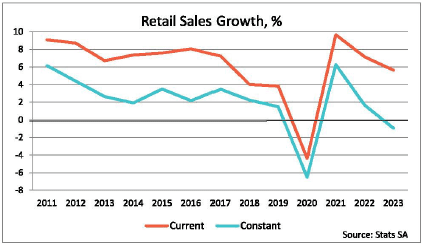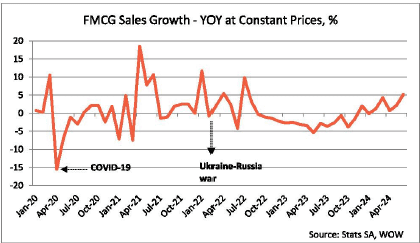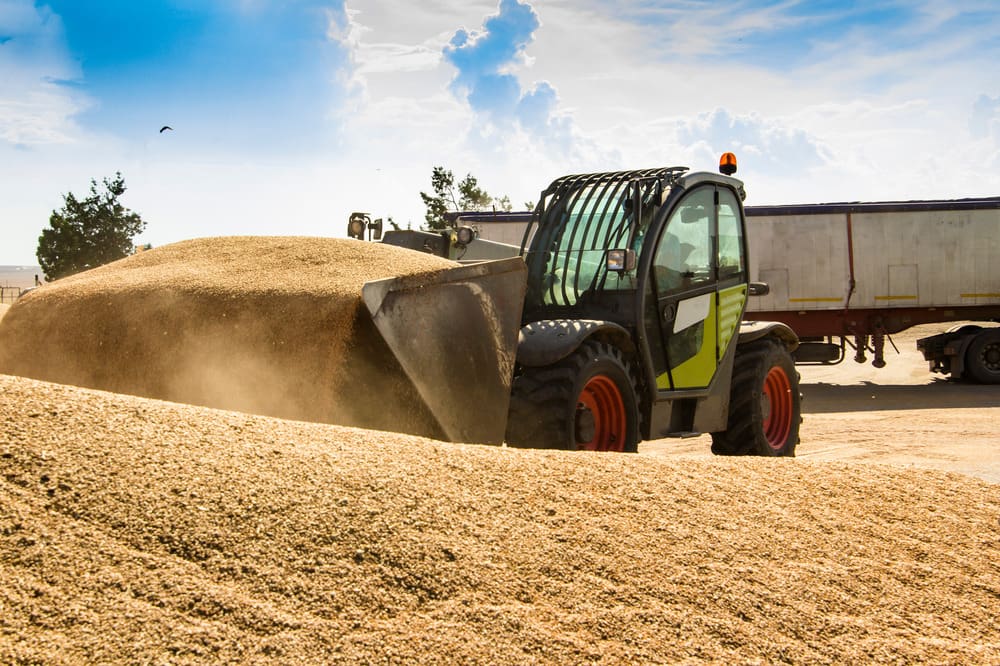FMCG in the era of sustainability: South Africa’s story
The drivers of FMCG in South Africa
As explained in the WOW report on fast moving consumer goods (FMCG) trends in South Africa, FMCG covers all the things we buy daily including groceries or packaged goods such as food, beverages, personal care items, and household goods. This sector has evolved significantly over the last century due to various factors, including industrialisation, technological advancements, globalisation, and shifts in consumer behaviour.
Economic growth and the South African FMCG sector
For manufacturers and retailers, the quest for growth is driven but also limited by population and income growth. With South Africa having one of the highest income inequality levels globally, FMCG companies experience challenges as they must cater for both low-income consumers and high-end markets. It is telling then that, sales of FMCG goods declined in 2023 as shown in the graphs below, according to the WOW report.
The graphs below illustrate how economic shocks like Covid-19 and the start of the war in Ukraine can affect industries. More concerning circumstances such as low economic growth, high inflation and high interest rates have a much more fundamental and long-term impact.
The most difficult of the primary culprits is of course low economic growth. In South Africa that growth has been so low, and in fact lower than the population growth, which inevitably contributed to a drop in income per person.
The government introduced initiatives such as Operation Vulindlela, a joint initiative with the National Treasury, focusing on structural reforms in sectors like energy, telecommunications, and water. While these measures have spurred some sectoral improvements, overall economic growth remains constrained. Investors remaining cautious and staying on the sidelines, has also been a limiting factor.
The extended period of high unemployment, negative real salary increases and high interest costs have increased the stress on FMCG retailers in the fight for market share and profitability growth. In their response to the trend of buying down, which was very noticeable in 2023, they have added lower cost private label products and are seeking further expansion in townships, which are underserviced in terms of larger retail space.
The pros and cons of technological advancement
On the one hand, technological advancements opened market opportunities for the FMCG sector in areas like online retailing, but on the other, it brought about heightened competition by enabling more players to reach consumers and innovate rapidly. With the rise of ecommerce, smaller and niche brands can now compete alongside established names, leveraging digital platforms to gain visibility without the traditional costs of brick-and-mortar retail.
Improved logistics and better information about the industry and consumer sentiment has seen a change in focus. There have been shifts in focus to online shopping and sustainability. Online shopping growth by far exceeds overall growth of the FMCG market and is expected to continue in the foreseeable future.
How big brands are tackling the township economy
A more interesting development in South Africa is the realisation of the size of the more informal trade in townships which runs into billions of rands. Advancements in logistics and technologies for stock management and distribution, as well as deeper market insights with the help of AI, has the big retailers and manufacturers taking township spaza shops seriously.
BevCo, a subsidiary of multinational Pepsi, is selling directly to spaza shops, bypassing wholesalers and saving on distribution costs. BevCo told Daily Investor that the single biggest challenge to entering the informal market is undoubtedly the vast number of stores.
“Nobody has exact data, but most research articles estimate there to be around 150,000 spaza stores in South Africa,” BevCo stated.
Sustainability in the FGMC sector
The sustainability issue revolves mainly around the reusability and recyclability of packaging. An innovative idea of selling decanted products to communities by NGOs such as Wakanda, will certainly be impeded by recent incidents of children being poisoned by contaminated food items purchased at local spaza shops.
However, packaging is almost a non-negotiable for premium brands which also use shrinkflation as a means to increase profitability. For example, some chocolate bar previously in paper packaging have become smaller and thinner (fragile), needing solid cardboard packaging over and above the silver covering to maintain freshness.
The African expansion of successful South African retailers has confirmed that many things have to be in place for a successful investment. To tap into the township economy and African countries, requires innovative ways of making products affordable while addressing logistical challenges. Logistics, import-export duties, currency and exchange controls can create an unwelcome and unprofitable environment.
In South Africa, the FMCG sector appears to be on a moderate growth path, aided recently by the new political dispensation and the prospects of lower interest rates.
Contact us to access WOW's quality research on African industries and business
Contact UsRelated Articles
BlogCountries ManufacturingSouth Africa
The Flour and Grain milling industry – from field to table
Contents [hide] The flour and grain mill products manufacturing industry is crucial to the South African economy and livelihoods. Staple foods like maize and wheat are essentially a commodity. They...
BlogCountries ManufacturingSouth Africa
The Evolution of South Africa’s Cosmetics Industry: Past Growth and Future Opportunities
Contents [hide] South Africa’s cosmetics industry has grown significantly over the past few decades and evolved from a market once dominated by international brands into a vibrant sector with dynamic local...
BlogCountries ManufacturingSouth Africa
The future of oil and gas in South Africa
Contents [hide] The latest WOW report on the petroleum industry in South Africa indicates that the future of oil and gas in South Africa is at a critical stage. Oil...







